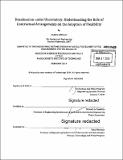| dc.contributor.advisor | Richard de Neufville. | en_US |
| dc.contributor.author | AlMisnad, Abdulla | en_US |
| dc.contributor.other | Massachusetts Institute of Technology. Technology and Policy Program. | en_US |
| dc.date.accessioned | 2015-06-10T19:09:23Z | |
| dc.date.available | 2015-06-10T19:09:23Z | |
| dc.date.copyright | 2014 | en_US |
| dc.date.issued | 2014 | en_US |
| dc.identifier.uri | http://hdl.handle.net/1721.1/97322 | |
| dc.description | Thesis: S.M. in Technology and Policy, Massachusetts Institute of Technology, Engineering Systems Division, Technology and Policy Program, 2014. | en_US |
| dc.description | Cataloged from PDF version of thesis. | en_US |
| dc.description | Includes bibliographical references (pages 93-97). | en_US |
| dc.description.abstract | The development of new infrastructure projects is a key part of global efforts to meet the demands of growing populations in times of increasing uncertainty. The deterministic approaches commonly used for the development of such infrastructure, however, are not adequately suited to the volatility of these new sources of uncertainty. Stochastic analytical methods have been identified as promising alternatives that are able to deliver considerable value in the face of uncertainty. Despite this promise, however, these approaches have seen limited application in the development of actual infrastructure projects. Much of the existing body of work discussing flexibility identifies limited analytical abilities, and difficulties in the creation of flexible design alternatives as some of the barriers to the implementation of flexibility. This thesis posits that the contractual arrangements typically used to develop such projects can also act as barrier to the adoption of flexibility. Both the distribution of gains from flexibility and risks that each participant faces due to the different contractual arrangements as well as the interactions of the decisions made by each participant results in the adoption of different levels of flexibility under each contractual scenario. The specific way in which different contractual scenarios influence the ultimate adoption of flexibility is context specific and depends on how different participants might react to the risks posed by the contracts. Rather than make a recommendation for the adoption of a particular set of contracts, this thesis suggests that project proponents seeking to adopt flexibility need to take additional steps to evaluate the risks associated with flexibility and ensure that the distribution of value from the adoption of flexibility is in line with these risks. | en_US |
| dc.description.statementofresponsibility | by Abdulla AlMisnad. | en_US |
| dc.format.extent | 112 pages | en_US |
| dc.language.iso | eng | en_US |
| dc.publisher | Massachusetts Institute of Technology | en_US |
| dc.rights | M.I.T. theses are protected by copyright. They may be viewed from this source for any purpose, but reproduction or distribution in any format is prohibited without written permission. See provided URL for inquiries about permission. | en_US |
| dc.rights.uri | http://dspace.mit.edu/handle/1721.1/7582 | en_US |
| dc.subject | Engineering Systems Division. | en_US |
| dc.subject | Technology and Policy Program. | en_US |
| dc.title | Desalination under uncertainty : understanding the role of contractual arrangements on the adoption of flexibility | en_US |
| dc.title.alternative | Understanding the role of contractual arrangements on the adoption of flexibility | en_US |
| dc.type | Thesis | en_US |
| dc.description.degree | S.M. in Technology and Policy | en_US |
| dc.contributor.department | Massachusetts Institute of Technology. Engineering Systems Division | |
| dc.contributor.department | Technology and Policy Program | |
| dc.identifier.oclc | 910318752 | en_US |
